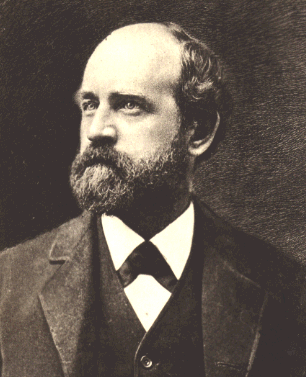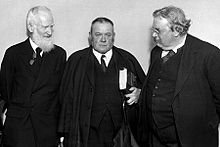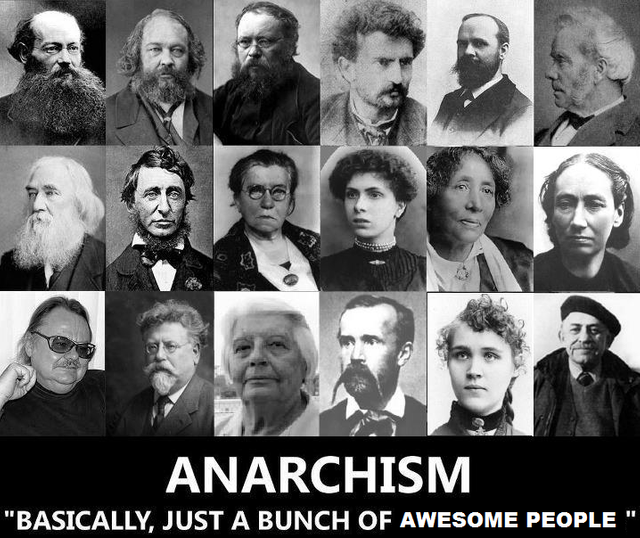Third Ways: Distributism, Georgism, & Social Democracy
Recently, I have transitioned away from anarchism. This leaves me in one of those awkward phases where I can't quite define my views as easily as I once could. Of course, I was always the odd one in the anarchist camp anyways, so maybe this isn't much of a change. At any rate, I wanted to delve into the question of socialism. Am I a socialist or not? Well, the answer to that question will obviously depend on how you define the term "socialism."
I guess my view has a lot of nuances that make it difficult to state clearly whether or not I am a socialist. In some ways, my personal philosophy falls within the realm of third ways beyond the capitalism-socialism binary. There are three such third way philosophies that have heavily influenced my ideas: (1) distributism, (2) social democracy, and (3) georgism. While I am quite familiar with libertarian and socialist literature, and have been influenced heavily by libertarian socialist ideas especially, I think that these three third way philosophies are in some respects more important for understanding my own political and economic ideas. The socialist critique of capitalism is indispensable, but the solutions proposed by socialists are, in my opinion, not the best options available.
In a very real way, these third way philosophies hark back to the American founding fathers. Distributism is basically in line with the ideas of Thomas Jefferson and Benjamin Franklin, only updated for an industrial society. Georgism and social democracy largely overlap with the ideas of Thomas Paine. If harking back to the ideas of the founders is the essence of conservatism, then my extremely liberal ideas are profoundly conservative. At the same time, I am a libertarian. When it comes to political and economic philosophies, descriptive terms are often too ambiguous to be very descriptive.

Distributism
Distributism is a social, economic, and political philosophy rooted in Roman Catholic social doctrine. Personally, I do not believe in Catholicism or Christianity. I merely find that I do agree substantially with certain aspects of Catholic social doctrine, in spite of my disagreements with a lot of the socially conservative aspects. The philosophy of distributism was developed and espoused by G. K. Chesterton and Hilaire Belloc, sometimes referred to as the Chesterbelloc.
The distributists, more or less, followed the socialist critique of capitalism. However, they did not advocate the wholesale abolition of private property as most socialists did. Most socialists wanted either the abolition of private property and its replacement with communal property or else a reforming of the institution of property along usufructuary lines. Thus, individualist anarchists and Ricardian socialists wanted artificial property, which is based on titles and legal privilege, to be replaced with natural property, which would be based on occupancy and use. Unused land would be considered abandoned and would fall back into the commons. Then anyone could become the owner of that land through homesteading, regardless of whether the land had previously belonged to a private individual or not. The distributists did not go so far as advocating reforms to the institution of property as such. Instead, they sought to affect the institution of property through other means that would make it unnecessary to actually alter the fundamental nature of property.
A common Chesterbellocian dictum goes, "The problem with capitalism is not too many capitalists, but too few capitalists." The problem with capitalism is that private property gets concentrated into the hands of too few individuals and the majority of people end up without any share of ownership in productive property. The end result is that the capitalist class, which owns the means of production, can live in luxury and afford to go their whole lives without actually working for a living, while the proletariat, who are unfortunate enough to be born without ownership of productive property, are enslaved to them as wage-laborers. The wage-worker is essentially a serf, just a couple steps higher than a slave.
The solution to this problem, in the estimation of distributists, is not to abolish private ownership of the means of production but to universalize it. And there are several ways that this goal can be accomplished. Hilaire Belloc proposed a differential tax on the purchase or exchange of land. A person with no land could purchase land without paying any sales tax on it. A person with a little land could purchase a little more land with only a small sales tax attached. A person with a good deal of land would have to pay a hefty sales tax in order to purchase more land. At some point, the tax would become so high as to be prohibitory. This would guard against the formation of a land monopoly. You could also tax the expansion of large industries in order to encourage large companies like Walmart to break up into several smaller companies over different regional areas. Like socialists, the distributists are in favor of co-operatives and worker-ownership of industry. However, they don't push for worker-management as much. Workers within large-scale industries ought to be given shares of ownership in order to create a wider distribution of ownership of productive property. Worker-management is not necessarily the best. If there is a consensus process or a democratic process for decision making, this may be a burden in a large-scale company. Distributists tend to see distributing shares of ownership as more beneficial than distributing control of industry. Most workers would rather have a greater share of profits and higher income without the added burden of having to participate in the decision-making process. Having certain workers with supervisory and managerial roles might be preferable to worker-management and collective decision making, especially if you ensure that managers only get a standard share of profits, like all other workers, and cannot choose their own wages. Additionally, distributists are generally in favor of taxing large companies and using the revenue to subsidize small and local businesses.
If the government will implement distributist policies, it will create a distributist economy in which there is widespread ownership of productive property. This would reduce inequality and create a more egalitarian society. There will be some level of inequality, but the gap between the haves and the have-nots will be reduced to such an extent as to make the remaining inequalities into a non-issue.
Distributism has surprisingly little to say about the form that government should take. However, distributists do insist that all tasks should be handled by the smallest and least centralized authority capable of efficiently carrying out said task. This idea is known as subsidiarity. It is a fundamental principle of distributism that matters that can be handled effectively at the municipal level ought not to be dealt with by the centralized State.

Distributism is basically identical to the position of Thomas Jefferson:
"This little attendrissement, with the solitude of my walk, led me into a train of reflections on that unequal division of property which occasions the numberless instances of wretchedness which I had observed in this country and is to be observed all over Europe.
"The property of this country is absolutely concentrated in a very few hands, having revenues of from half a million of guineas a year downwards. These employ the flower of the country as servants, some of them having as many as 200 domestics, not laboring. They employ also a great number of manufacturers and tradesmen, and lastly the class of laboring husbandmen. But after all there comes the most numerous of all classes, that is, the poor who cannot find work.... I am conscious that an equal division of property is impracticable, but the consequences of this enormous inequality producing so much misery to the bulk of mankind, legislators cannot invent too many devices for subdividing property, only taking care to let their subdivisions go hand in hand with the natural affections of the human mind. The descent of property of every kind therefore to all the children, or to all the brothers and sisters, or other relations in equal degree, is a politic measure and a practicable one. Another means of silently lessening the inequality of property is to exempt all from taxation below a certain point, and to tax the higher portions of property in geometrical progression as they rise. Whenever there are in any country uncultivated lands and unemployed poor, it is clear that the laws of property have been so far extended as to violate natural right. The earth is given as a common stock for man to labor and live on. If for the encouragement of industry we allow it to be appropriated, we must take care that other employment be provided to those excluded from the appropriation. If we do not, the fundamental right to labor the earth returns to the unemployed. It is too soon yet in our country to say that every man who cannot find employment, but who can find uncultivated land, shall be at liberty to cultivate it, paying a moderate rent. But it is not too soon to provide by every possible means that as few as possible shall be without a little portion of land."―Thomas Jefferson (To James Madison [October 28, 1785])

Social Democracy
Social democracy, in the sense that I am using the term, is a certain trend that arose within the socialist movement. This tendency was also called evolutionary socialism or fabian socialism. Social democracy was espoused by Eduard Bernstein, Annie Besant, and George Bernard Shaw, among others. Although rooted in socialist theory, the theory of social democracy ultimately departed significantly from orthodox marxism. Although the early theorists still identified as socialists, most orthodox marxists denied the legitimacy of their claim to the "socialist" label.
The social democrats pointed out two major tendencies that became apparent in the late 1800s: (1) democratic processes were proving to be successful as a means to improving the lot of the working class, and (2) local monopolies were increasingly being taken over by municipalities. To a large extent, the social democrats were correct in their observations. Through a combination of voting for socially-minded politicians and vigorous organizing and protesting (which often involved using civil disobedience and other anarchic methods, as well as strikes and union organizing), the workers were able to raise themselves out of the miserable conditions imposed on them by capitalist exploitation and the industrial revolution.
The workers succeeded in getting the 8-hour workday, minimum wage, better working conditions, etc. The social democrats realized that the electoral process, combined with grassroots organizing and agitation, could get sensible reforms pushed through and make life better for the entire populace. Ultimately, we ended up with OSHA, the EPA, and other regulatory agencies, which made working conditions safer and got rid of the smog and pollution that plagued early industrial society. At the same time, municipalities took over ownership of local monopolies. Utility companies and postal services tended to be run on a monopolistic basis. Competition in certain industries proved to be of no use. Monopolies inevitably arose and monopoly prices and poorer services came with them. Municipalities took it upon themselves to either take over ownership of these industries or else to heavily regulate them in order to counteract the negative aspects of monopolies. The municipality might use price setting to counteract monopoly pricing, and they might set certain standards of service. At the same time, workers in municipally-owned companies generally got better wages and benefits than those in private sector companies. The social democrats thought that this trend of municipal socialism might continue. As more municipally-owned industry emerged, the municipally-owned companies would demonstrate their superiority over private sector businesses. It was hoped that these municipally-owned companies would out-compete private industry and become the norm. The social democrat did not advocate a socialist economy as much as a mixed economy, where certain companies and institutions were publicly-owned. It was merely hoped that these socialistic arrangements would become more prevalent. The existence of municipal-employment, where workers received better wages, had better conditions, and more benefits, actually eliminated the need for full socialism. Government employees would end up setting the standard with regard to wages, benefits, etc. We actually see this in America with the push for a higher minimum wage and with the ACA (ObamaCare). The conditions of employment enjoyed by government employees is being expanded to the entire populace.
As time moved on, social democrats moved away from their evolutionary/fabian socialist roots and began to focus more on improving social welfare within the framework of the existing system. Their emphasis shifted towards social welfare. They pushed for universal education, universal healthcare, and such. The social democrats came to believe that progressive taxation was both morally justified and beneficial for society.
"Amartya Sen has a brilliant argument for the justice of progressive taxation. Suppose that there is a flat income tax of 50%. A person making 10,000 dollars a year will pay 5,000 dollars in taxes. That’s nearly a year’s worth of mortgage payments! A person making 1,000,000 dollars a year will pay 500,000 dollars. However, the amount that they are left with is ridiculously large. The rich man still enjoys a standard of living that is 100 times greater than that of the poor man mentioned. The total revenue brought in by this flat tax on these two individuals is 505,000 dollars. Yet, the flat tax has impoverished the first individual and allowed the second individual to still live in luxury. The flat tax is not a fair tax because the burden of the tax is heavier on the poor than on the rich. The first man is likely a laborer, who works hard every day. The second man is likely a speculative investor who earns the majority of his income from exploiting the system or by exploiting people. Let’s revise our tax system along progressive lines. The first man will now pay a 10% tax, costing him a manageable 1,000 dollars per year. The second man will now pay a 51% tax, which is not much of an increase. He will now pay 510,000 dollars. This still leaves the wealthy man with plenty of wealth. By no means is either individual impoverished by this tax. Yet, this progressive tax actually brings in more revenue. This progressive tax is more reasonable and more equitable because it ensures that the burden of taxation is fairly distributed and brings in more revenue at the same time."―ekklesiagora
If the wealthy are taxed more highly in order to fund welfare programs from which everyone benefits, then society as a whole is much better off. Furthermore, the wealthy were only able to become wealthy as a result of social infrastructure and institutions. If society had not created schools to educate the would-be workers, capitalists would be left with uneducated and less productive workers. If the government had not built the roads and infrastructure that capitalists use to transport their products for distribution and sale, the capitalists would not be able to make much money at all. Speculative investors buy land and wait for the surrounding area to be developed. When the local community puts in roads, schools, grocery stores, and a post office, then the value of the land increases dramatically and the speculative investor can sell it or rent it at a greatly inflated price in order to make huge profits. Wealthy people in our society are only wealthy because of the framework and benefits they receive from our society and our government. Consequently, they really owe some of their wealth to the community that helped to make them prosperous.
Ultimately, social democrats ended up like distributists insofar as they determined that the best way to fix the problem with capitalistic private property was not to abolish private property altogether, but rather to adopt policies that have the effect of redistributing wealth and eliminating the negative consequences of property that emerge under unregulated laissez-faire capitalism.

Georgism
Georgism also attempts to remedy the problems inherent in capitalism without abolishing private property or fundamentally altering the form of property. The term georgism refers to the analysis and proposals of Henry George. George basically followed the typical libertarian socialist analysis of the problem with capitalistic private property. His proposed solution is a reform that would confiscate unearned income through a land value tax.
The institution of private property allows land speculators to buy land, wait for the value of the land to increase as the surrounding area is developed, and then sell or rent at a higher price. Without contributing any labor, the land speculator can make a lot of money in the form of unearned income. The municipality builds roads and schools, the local businessmen put in grocery stores and gas stations, and other people build subdivisions in the area. All of these developments have the unintended consequence of increasing the value of the land speculator's property. The land speculator can buy a piece of land for 10,000 dollars and do nothing with it (they don't even have to maintain the land or ever step foot on it!), then they can wait 5 to 10 years and sell it for 100,000 dollars after the surrounding area has been developed and land value has increased. Property has historically been justified on the grounds that a person is entitled to the entire product of their own labor, but how exactly is someone entitled to value that was contributed by society while they laid back and did nothing?
A mortgagee (bank) can lend 30,000 dollars to an individual to purchase a piece of land, the mortgagor (borrower) can then build a house on the land. Suppose that the borrower spends 30,000 dollars of their own money to build a house on the land. Years later, the borrow falls behind on payments, after having paid 25,000 dollars or more towards the loan. The bank then forecloses on the property, confiscating the land and the added value that was contributed by the borrower. The borrower really owed just 5,000 dollars more, but the bank has kept the 25,000 he has already paid, and it has confiscated the 30,000 dollar property in land along with the 30,000 dollar house. The bank legally acquired 85,000 dollars worth of value for a debt of 5,000. This is why Pierre-Joseph Proudhon asserted that "property is theft." Capitalistic property arrangements allow this sort of theft behind the scenes. For more information on the libertarian socialist critique of property and capitalism, you can check out my series Property as Theft: The Libertarian Socialist Critique of Property.
Henry George, like the libertarian socialists, believed that people are naturally entitled to any value that they create themselves, through their own labor. If a person builds a house, they are fully entitled to the value that they contributed through their own labor. However, no one is entitled to value contributed by others. So, George's solution was a land value tax, where the community would tax the value of the land. The owner should not be taxed on the value of buildings and structures that they add to the land, but merely on the value of the land itself. If the value of the land increases as a result of the municipality putting in roads and schools, then the land-owner should have to hand over that value (or some portion of it) to the community.
Georgism can be justified by appealing to the fact that land does not naturally belong to anyone. In a state of nature, every individual can use the land. No one has any more natural right to a piece of land than anyone else. Access to the earth is the natural birthright of all humans. If an individual is going to take over some portion of the earth as their own private property and exclude others from the land, then it is only fair that the individual who claims exclusive ownership and excludes the rest of the community from the land should have to compensate the community. The private owner has the special privilege to exclude the rest of the community from their land, but this is just an artificial legal privilege. This is not a natural right! In fact, it is the existence of society, with its system of rules and arbitration, which allows for the existence of private property in the first place, so it is only fair that the private owner of land should have to pay his dues in the form of a land value tax.
Henry George advocated using the revenue from the land value tax to fund the government. The government could be funded via land value tax, which would be highly progressive since more valuable land would be taxed higher than less valuable land. If a company owns an oil field or a gold mine, the value of their land will be much higher than the value of a plot of land that merely consists of a quarter-acre lot and a simple home. George suggested that income tax, sales tax, and all other forms of taxation could be abolished and replaced with this "single-tax." This would greatly reduce government bureaucracy. At the same time, this land value tax would eliminate some of the negative side effects of capitalistic private property. In theory, the whole idea of georgism rests on the assumption that all land ought to be owned by the community. In essence, the community would be renting the land to the private owners. Georgism is a way of having communally-owned land without actually having to take the land away from the private owners.
However, Thomas Paine had an alternative proposal, wherein the revenue generated by the land value tax would be divided up and given back to the individuals that comprise the community in the form of a citizens' dividend. I actually prefer Thomas Paine's proposal to Henry George's.
"It is a position not to be controverted that the earth, in its natural uncultivated state was, and ever would have continued to be, the common property of the human race. In that state every man would have been born to property. He would have been a joint life proprietor with the rest in the property of the soil, and in all its natural productions, vegetable and animal.
"But the earth in its natural state, as before said, is capable of supporting but a small number of inhabitants compared with what it is capable of doing in a cultivated state. And as it is impossible to separate the improvement made by cultivation from the earth itself, upon which that improvement is made, the idea of landed property arose from that inseparable connection; but it is nevertheless true, that it is the value of the improvement only, and not the earth itself, that is individual property. Every proprietor, therefore, of cultivated land, owes to the community a ground-rent (for I know of no better term to express the idea) for the land which he holds; and it is from this ground-rent that the fund proposed in this plan is to issue....
"There could be no such thing as landed property originally. Man did not make the earth, and, though he had a natural right to occupy it, he had no right to locate as his property in perpetuity any part of it; neither did the creator of the earth open a land-office, from whence the first title-deeds should issue. Whence then, arose the idea of landed property? I answer as before, that when cultivation began the idea of landed property began with it, from the impossibility of separating the improvement made by cultivation from the earth itself, upon which that improvement was made. The value of the improvement so far exceeded the value of the natural earth, at that time, as to absorb it; till, in the end, the common right of all became confounded into the cultivated right of the individual. But there are, nevertheless, distinct species of rights, and will continue to be so long as the earth endures....
"Having thus in a few words, opened the merits of the case, I shall now proceed to the plan I have to propose, which is,
"To create a National Fund, out of which there shall be paid to every person, when arrived at the age of twenty-one years, the sum of fifteen pounds sterling, as a compensation in part, for the loss of his or her natural inheritance, by the introduction of the system of landed property:
"And also,
"The sum of ten pounds per annum, during life, to every person now living, of the age of fifty years, and to all others as they shall arrive at that age."―Thomas Paine (Agrarian Justice)
Thomas Paine proposed a land value tax as a way of funding a citizen's dividend or universal basic income as a social welfare scheme. Paine's variation of the land value tax proposal is the one that I personally embrace.

Integrating These Third Ways
I don't see these various third way solutions as being mutually exclusive. It is possible to take insights from all three and integrate them into a single coherent third way approach to politics and economics. Personally, I am heavily influenced by libertarian socialist analysis, especially the critique of capitalism and authority, but I have come to believe that distributism, social democracy, and georgism are likely to have more beneficial effects than orthodox socialism and communism. My ultimate goal is the maximization of happiness, which I believe is more likely to be achieved by a syncretic and eclectic third way approach than it is by a conventional socialist approach.

Distributism and georgism, in my estimation, are not fully-developed philosophies per se. Distributism is a perspective or orientation, but it leaves a lot lacking. It holds that ownership of productive property ought to be widely distributed and that government ought to help ensure this wide distribution, but it has surprisingly little to say about the form of government itself. A distributist can advocate virtually anything from monarchism to representative democracy. J. R. R. Tolkien advocated a sort of anarcho-monarchism, paradoxical and nonsensical as that may sound. Georgism revolves around tax reform, so it too has surprisingly little to say about the form that a political system ought to take. Distributism and georgism are basically oriented around policy proposals and the goal of eliminating the negative effects of private ownership of the means of production. Social democracy, however, has a stance on government itself. Social democrats are advocates of representative democracy. Personally, I wish to implement the proposals of distributism and georgism within the framework of representative democracy, so I integrate georgist and distributist insights into social democratic theory.
Libertarianism

I have been heavily influenced by libertarian socialism. Consequently, I have developed a version of social democratic theory that is distinctly libertarian. There are several ideas that I have borrowed from libertarian socialism: (1) the notion that representatives or delegates ought to be subject to representative recall, so that the constituents of any politician can easily remove and replace a representative that behaves erratically or unethically in their estimation, (2) that political candidates ought to be chosen by sortition or lottery, thereby eliminated career politicians, (3) that the enforcement of community rules should be done by communal police forces in which the officers are chosen at random or on a rotational basis, (4) that security for the protection of persons and property ought to be linked to insurance, so that a person is compensated by the communal security agency for damages or losses as the result of crime, and (5) that all able-bodied citizens within a certain age range should serve in the militia or national guard and that the military, consisting of federated militias, should be democratized so that soldiers rather than politicians are in charge of decision-making. These libertarian aspects of my thought are elaborated on in Libertarian Social Democracy: The Structure of a Free Society and Libertarian Social Democracy & National Defense.
Wow, very nice stuff. Really thought through and a lot of history here.
Thanks very much!
I'll probably have to share this with the famlia..
Thanks, I'm glad you enjoyed it.
Very well written. I actually learned a few things from this.
Thanks.